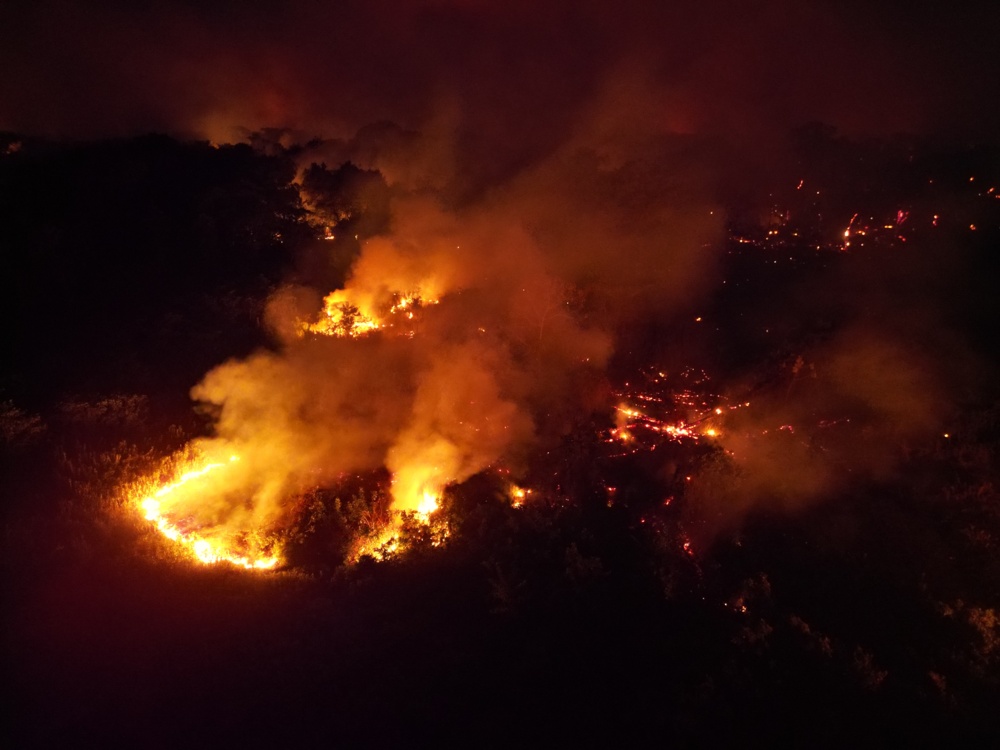
EJF macht auf die globale Waldbrandkrise aufmerksam, während die COP30 in Brasilien fortgesetzt wird
m Rahmen der voranschreitenden COP30-Klimaverhandlungen in Belém ruft die Environmental Justice Foundation (EJF) zu dringendem globalem Handeln auf, um eine der gravierendsten Ursachen und Folgen der Klima-Notlage zu adressieren: Waldbrände. Der neue EJF-Bericht, Where there’s smoke: six wildfire stories, zeigt auf, wie die fortschreitende Klimakrise weltweit beispiellose Brände beschleunigt.
Von März 2024 bis Februar 2025 allein fielen weltweit mehr als 3,7 Millionen Quadratkilometer Land Bränden zum Opfer – eine Fläche größer als die Indiens. Dabei wurden 9 % mehr Kohlenstoff ausgestoßen als im Durchschnitt der letzten 20 Jahre. Brände in wichtigen Kohlenstoffsenken wie Wäldern und Feuchtgebieten setzen enorme Mengen an Treibhausgasen frei, bedrohen die biologische Vielfalt und Lebensgrundlagen und treiben die globale Erwärmung weiter voran.
Der Bericht enthält Zeugnisse aus erster Hand von direkt betroffenen Gemeinschaften und Umweltverteidiger*innen. Indigene Feuerwehrleute im brasilianischen Pantanal berichten davon, dass sie Brände mit mangelhafter Ausrüstung bekämpfen müssen. In Indonesien warnen Aktivist*innen, dass großflächige industrielle Rodungen weiterhin Torfbrände auslösen, die sich über Grenzen hinweg ausbreiten. Im Vereinigten Königreich und im Kongobecken mahnen Wissenschaftler*innen, dass steigende Temperaturen Torfgebiete, einst wichtige Kohlenstoffsenken, in Emissionsquellen verwandeln. Bewohner*innen Griechenlands und Kaliforniens berichten von ihrem Leben, das durch immer heftigere Brände aus den Fugen gerät.
„Waldbrände gehören zu den sichtbarsten und zerstörerischsten Folgen des Klimakollapses. Brasilien war in den letzten Jahren besonders stark betroffen, insbesondere durch die verheerenden Pantanal-Brände 2020. Aber es ist eine globale Krise und braucht globale Aufmerksamkeit hier in Belém”, sagte Luciana Leite, Leiterin des EJF-Büros in Brasilien. „Wie die sechs Geschichten zeigen, zerstören Waldbrände Leben, entwurzeln Gemeinschaften und bedrohen Ökosysteme in alarmierendem Tempo.”
Zur COP30 fordert EJF die Regierungen auf:
- Die Treibhausgasemissionen drastisch zu senken, die Finanzierung der Klimaanpassung zu erhöhen und anzuerkennen, dass die globale Erwärmung der Haupttreiber des steigenden Waldbrandrisikos ist.
- Kohlenstoffreiche Ökosysteme wie Torfmoore und Feuchtgebiete durch gezielte Finanzierung naturbasierter Losungen zu schutzen und wiederherzustellen.
- Indigene und lokale Gemeinschaften zu stärken und ihr Wissen sowie ihre Anleitung bei der Waldbrandbekämpfung und Klimapolitik einzubeziehen.
Steve Trent, CEO und Gründer von EJF, sagte: „Von Amazonien bis zur Arktis, von Torfmooren bis zu Regenwäldern zeigen uns die Waldbrände, dass die Klimakrise bereits angekommen ist. Aber sie erinnern uns auch an die Lösungen, die wir zu lange vernachlässigt haben: die Natur schützen, diejenigen unterstützen, die sie verteidigen, und unsere Abhängigkeit von Kohlenstoff schnell beenden. Jedes Zehntelgrad zählt; ohne dringende, gerechtigkeitsorientierte Klimaschutzmaßnahmen wird sich diese Krise weiter verschärfen. Die COP30 muss ein Wendepunkt sein.”
ENDE
Anmerkungen für Redakteur*innen
Bericht hier lesen.
Über EJF
EJF setzt sich für Umweltgerechtigkeit ein, mit dem Ziel, unser globales Klima, unseren Ozean, Wälder, Feuchtgebiete und Wildtiere zu schützen und das grundlegende Menschenrecht auf eine sichere natürliche Umwelt zu verteidigen, in dem Bewusstsein, dass alle anderen Rechte von Letzterem abhängen. EJF arbeitet international daran, die Politik zu informieren und systemische, dauerhafte Reformen zum Schutz unserer Umwelt und zur Verteidigung der Menschenrechte voranzubringen. Wir untersuchen Missstände, decken sie auf und unterstützen Umweltaktivist*innen, indigene Völker, Gemeinden und unabhängige Journalist*innen, die unmittelbar gegen Umweltungerechtigkeit kämpfen. Kontakt: media@ejfoundation.org.
SIGN UP FOR OUR EMAILS AND STAY UP TO DATE WITH EJF

